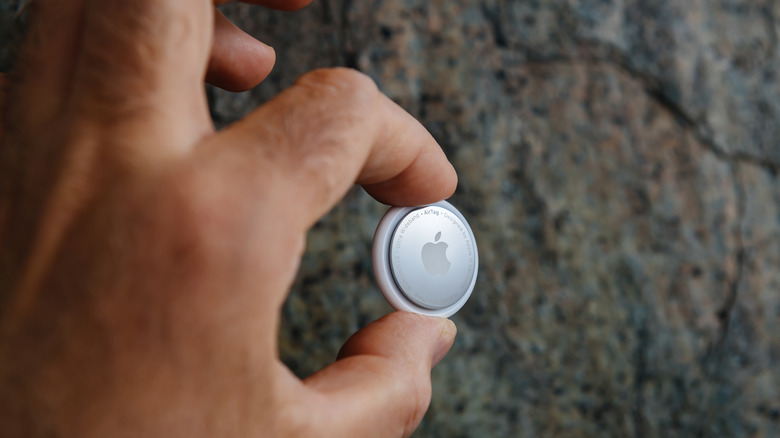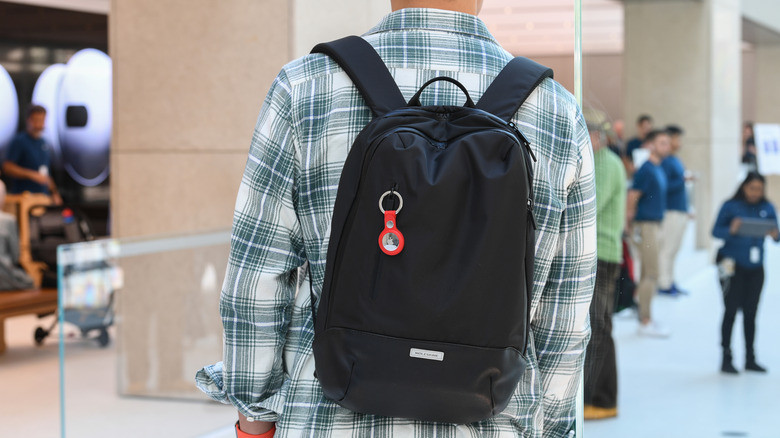5 Things You Shouldn't Track With An AirTag (And Why)
Apple released the AirTag back in 2021, and since then, it's been one of its best, most affordable products. For $29, you can slip this bad boy into a purse, backpack, or piece of luggage — or anywhere else it fits — and track something virtually anywhere in the world using Apple's free Find My network comprised of other nearby Apple devices. There's perhaps no easier or cheaper way to hunt something down, and the current AirTag design is so good that even now, they're worth the price of entry. AirTags 2 might still be a long time off and may not even be a huge upgrade. Of course, AirTags are not the best solution for every situation, so there are a few things you probably shouldn't use them for.
Some of it comes down to the technology and reliability. The way Apple AirTags work means they simply can't compete with more accurate and reliable methods, like GPS. Even if they are suited for your needs, they're prone to errors like giving you the wrong location. And of course, some of it comes down to plain old morals. We want to be clear: Some of the items on this list can technically be tracked with an AirTag, but we don't think it's the best option for reasons we'll get into. With that out of the way, here are five items you shouldn't track with AirTags.
People
You should not use an AirTag to track someone without their consent, that goes without saying, but we concede that there may be a slim few well-intentioned reasons why a person might want to anyway. Parents trying to keep track of their kids, for example. However, even in a situation where it's morally acceptable and/or consensual, there are a couple of reasons why we'd dissuade you.
First, AirTags support anti-stalking measures. They'll automatically alert people — regardless of whether they use an iPhone or an Android phone — that there's an unknown AirTag nearby if it's been following them. Either they'll get a notification on their phone, or they'll hear the AirTag beeping. Once they get an alert about an unknown AirTag, they're able to home in on it with its alert sounds or the Precision Tracking on their iPhone, making it almost impossible to not find. Again, even if you have the best intentions, the person you're tracking may not realize it was you that put the AirTag there. They might throw it away, report it to the police, or confront you for a very, very awkward conversation.
The other reason is that there are much more convenient and practical ways to track someone consensually. Find My supports automatic location sharing from an iPhone or another Apple device. Have the person you want to track allow you to see their location at any time in the People tab of Find My. This can also be used to let you know when a person has left an area and when they've arrived, such as a roommate that's gone on a date. Members of the same family group can set up automatic location sharing, too. I have been using the latter for years, and it works flawlessly.
Cars
Lots of people use AirTags in their car — I do. They're super handy if you parked in a big, crowded lot and forget your spot. However, when it comes to AirTags and GPS trackers, AirTags are not the best choice for knowing the whereabouts of a vehicle. For theft prevention, they're a pretty poor solution; the thief, as we have explained previously, would find out that there's an AirTag in the vehicle and would have all the tools they need to locate it, remove it, and destroy it. Bye bye, car.
The second reason is that AirTags only work when there's an Apple device nearby. As such, they're not ideal for live-tracking a moving object. Your AirTag would only be able to report its location when it passed by another Apple device — so unless your car's in a gridlock where everyone has an iPhone, location updates could be sporadic and slow. For this reason, they're not the best solution for finding your car in a crowded parking lot; you'd be able to see an AirTag's last known location, sure, but unless there's a car nearby that someone left their iPhone in, you wouldn't be able to ping it or use Precision Finding to orient yourself. Tracking your car in a less-populated area would, likewise, be difficult or impossible.
It's easy to see why AirTags are so popular for this use case given that GPS tracking systems for cars often require expensive hardware and a subscription service. But if you're worried about thieves, or worried in general for whatever reason about where your car is, stick with a dedicated tracker. Of course, there's nothing wrong with leaving an AirTag in there just in case, for casual use, but don't make it your go-to solution.
Dogs
AirTags might seem like the natural choice for a dog (or other pet), especially with all those AirTag collars designed for that express purpose. And sure, some people have been able to find their dogs with this method. Regardless, it's not ideal. At risk of beating a dead horse, AirTags tracking pets will suffer from the same limitations of AirTags tracking cars; a runaway dog anywhere but a dense urban or suburban area with lots of nearby Apple devices may be difficult or impossible to locate. Anyone who owns a dog knows that dogs tend to be avoidant of people they don't know, too, meaning they may keep their distance from populated areas where nearby iPhones could ping them.
There are also less obvious reasons why it's a bad choice. Dogs love to chew things up, and if that collar comes off somehow, they're liable to swallow the AirTag. Removing it from their gut could cost a small fortune. Even if they don't swallow it, dogs love getting wet and muddy, which could corrode the battery and potentially cause them to be burned by the acid (via CNET). People do sometimes steal lost dogs, too; this almost happened to me once, and had I been using an AirTag to track them, that new owner could well have removed it in the same way a car thief might.
So what should you use instead? There are plenty of highly rated smart collars to track your dog (or other pet) that don't have the weaknesses an AirTag does. Same as with car trackers, they can be pricier and they may require subscriptions to work — but they work. We'd say the investment is worth the peace of mind knowing exactly where Fido went after he dug under the fence.
Packages
The surge in package theft over the past years has led to an entire industry of Ring doorbell alternatives and a whole genre of internet videos where porch pirates snatch expensive packages off your doorstep moments after they arrive. It only seems logical that you'd stick an AirTag in a valuable package to make sure it gets there safely — and if it doesn't, to see where it actually ends up. But say it with us: The AirTag will tell the thief that it's there. And as someone who's had several packages opened or stolen by the very postal services handling them — particularly with international shipments — the presence of an AirTag could tell a potential thief that there's a valuable item for the taking.
Also consider how you would tell whether your package has actually been stolen. Unless it's a delivery service that alerts you immediately when the package has been delivered, you could end up mistaking the mail carrier weaving through your neighborhood on their regular run for a thief. And even if you are 100% sure it's been stolen, that information doesn't always guarantee that cops can find and stop the thief. AirTags have turned the tide on thieves in the past, but an AirTag — understandably — doesn't give authorities carte blanche to break down doors and search homes.
We want to repeat so we're not misunderstood here: We're not saying you shouldn't do this. For a high-value package, a $29 AirTag is better than nothing. But you may be better off getting package insurance or paying extra for a courier instead. Having said that, I have used AirTags in packages before, and they do a fairly good job showing their movement from place to place along the delivery route.
Anywhere it can't be hidden well
Unfortunately, because of the reason we have rehashed a million times already, AirTags can be found by thieves with relative ease — and because AirTags are so popular, thieves are likely to look for them when they steal something. So ironically, they're designed to help find lost or stolen items, and at the same time can defeat that purpose. Part of the issue is that most people (we'd wager) just toss an AirTag in their bags without a second thought, making it easily discoverable. You're wasting an AirTag's potential if you don't take a couple of extra minutes to hide it well.
My favorite example of this is Redditor u/mikerfx's ingenious solution to tracking his Steam Deck: hiding an AirTag inside it. As in, unscrewing the Steam Deck and placing the AirTag (wrapped in electrical tape to avoid short-outs) on the motherboard, then closing it back up again. It's safe to assume this would thwart all but the most tenacious and clever thieves. Most Steam Deck owners would probably pop it in their case.
We're not saying you need to go to extremes — like cracking open an expensive handheld — to hide the AirTag, we're just saying that being smart about the hiding place will go a long way, and hiding places that thieves don't expect could be what saves your lost or stolen item. For example, I've personally seen people sew AirTags into a backpack. AirTag batteries last for over a year, so they lend themselves to long-term solutions such as these. Think of it this way: Is it worth spending a couple of minutes jerry-rigging a solution to better track a stolen item, or losing something potentially worth hundreds of dollars? You choose.





